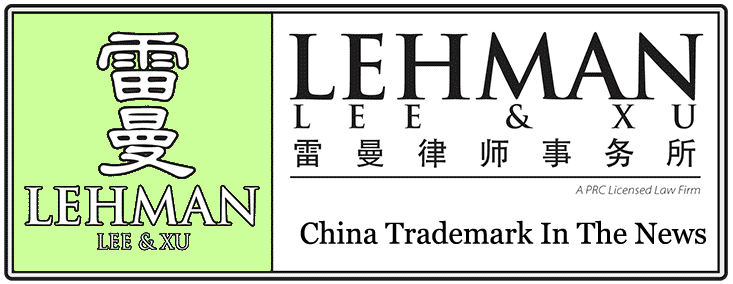
 |
|
LEHMAN, LEE & XU China Lawyer
|
|
China Trademark In The News
|
|
July 2013
|
The China Law News keeps you on top of business, economic and political events in the China. |
In the News |
China’s trademark squatting problem goes global |
People’s Daily, the flagship newspaper of the Communist Party, reported that well-known domestic seeds and nuts producer Qiaqia had its case upheld before the German Federal Supreme Court last week. The case against OKAI already had two previous court decisions holding that OKAI must cancel its registration of Qiaqia’s trademark. The article dubbed OKAI as a local company in Germany. While OKAI is a German GmbH (company with limited liability), the owner is in fact Chinese. “It is a classic case of carrying on the war at home abroad,” said Thomas Pattloch, head of China IP at Taylor Wessing in Munich. According to the article, as part of Qiaqia’s expansion strategy, the company decided to register its trademark and logo in several countries and regions in 2006. However, Qiaqia was unsuccessful in registering its marks in Germany because OKAI had already done so a year before in 2005. Qiaqia was familiar with OKAI as the latter was the former’s distributor in Germany. Qiaqia contacted OKAI who responded with an offer to transfer the trademark for an assignment fee of €18,000 ($24,000). “This is a very particular case. A clever Chinese businessman went abroad and trademarked the brand. This was part of the business strategy to gain from the trademark when Qiaqia needed it,” said Pattloch. OKAI registered the marks to create leverage and maintain its position as the sole distributor in Germany. “This is a big problem with Chinese small and medium-sized enterprises. They need to look closer at how to structure distributor contracts. They often come poorly prepared and shy away from legal advice,” said Pattloch. Two hearings The case was first before the Munich District Court and while the article reported that Qiaqia lost the case – it was actually a partial victory. The Court granted the cancellation and there was a cease and desist order for distribution on November 14 2007. However, only the trademark registered in classes of foodstuffs was cancelled, not the registered class of services. OKAI appealed the decision and under German law when one party appeals the other party can also appeal. Qiaqia wanted all of the trademarks to be cancelled and sought clarifications over procedural issues with the cease and desist order from the Munich District Court. The German Higher District Court upheld the decision from the Munich District Court on April 23 2009 in part as they limited the scope of the original decision and clarified issues over cease and desist. The Court stated that OKAI had registered the mark in order to force Qiaqia to go through that company, creating leverage to be the sole distributor. “That act was seen as deliberate, which would entitle the original trademark owner under the German Anti-unfair Competition Law to a cancellation of the trademark registered on behalf of OKAI based on illegal targeted obstruction as the distributor had no good reason to file for the trademark,” said Pattloch. OKAI further appealed the case but the German Federal Court’s ruling to uphold the previous decisions means the case is now closed. Lessons to learn Pattloch recommended that Chinese companies should file for a European Union community mark that would entitle the owner to protection throughout the 27 member states. “It does not cost that much to register a community mark and it is hard to understand why Chinese companies would shy away from registering it,” said Pattloch. The total cost for a Community Trademark (EU wide) is around €1,600 and €2,000 for multi-class applications. Pattloch noted that this is comparable to fees in China. In Germany, officials’ fees are €300 plus attorney disbursements between € 300 and €500. Chinese companies can also turn to the Ministry of Commerce (MOFCOM). The Ministry has been instrumental in providing support to domestic companies who wish to go abroad and conduct business in foreign countries. The Chinese government has also been known to intervene on certain occasions. For example, Pattloch recalled a dispute between Hisense and Bosch Siemens regarding trademark blocking in Germany. While support mechanisms are in place, it is thought Chinese companies are still not experienced enough or willing to learn the legal systems outside their own country. A change in attitude is necessary for their success abroad. This case is unusual but it highlights the need for Chinese companies, especially small and medium-sized entities, to protect themselves from trademark squatting at home and abroad. By David Tring http://www.chinalawandpractice.com/Article/3218704/Channel/9951/Chinas-trademark-squatting-problem-goes-global.html |
|
|
|
|